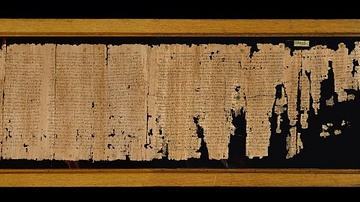Search
Did you mean: Sardis?
Search Results

Article
A Ghost Story of Ancient Egypt
The best-known ghost story from ancient Egypt is known, simply, as A Ghost Story but sometimes referenced as Khonsemhab and the Ghost. The story dates from the late New Kingdom of Egypt (c. 1570 - c.1069 BCE) and specifically the Ramesside...

Article
The Tales of Prince Setna
Among the most engaging and influential works from Egyptian literature are the stories in the cycle known as Setna I and Setna II or The Tales of Prince Setna. These are fictional works from the Late Period of Ancient Egypt (525-332 BCE...

Article
Life in a Japanese Buddhist Monastery
Buddhist monasteries have been part of the Japanese cultural landscape ever since the 7th century CE, and they remained both powerful and socially important institutions right through the medieval period. Today, many of Japan's finest examples...

Article
Buddhist Illuminated Scripts of Ancient Korea
The Goryeo (Koryo) kingdom ruled ancient Korea from 918 CE to 1392 CE, and it oversaw a flourishing of the arts, literature, and architecture. One of these developments was the production of finely crafted illuminated Buddhist texts. Painted...

Image Gallery
A Gallery of Death and the Afterlife in Ancient Egypt
Death in ancient Egypt was understood as a transition of the soul from the earthly plane to the afterlife, a rebirth, not a conclusion. After death, the soul passed through judgment by the god Osiris and, if justified by a life well-lived...

Video
The Egyptian Book of the Dead - A Guide to the Underworld
The Egyptian Book of the Dead, or better translated The Book of the Coming Forth by Day or Spells for Going Forth by Day is a collection of spells that help a deceased soul navigate the afterlife and make it to the Field of Reeds, or paradise...

Definition
Mahabharata
The Mahabharata is an ancient Indian epic where the main story revolves around two branches of a family - the Pandavas and Kauravas - who, in the Kurukshetra War, battle for the throne of Hastinapura. Interwoven into this narrative are several...

Definition
Ancient Persia
Persia (roughly modern-day Iran) is among the oldest inhabited regions in the world. Archaeological sites in the country have established human habitation dating back 100,000 years to the Paleolithic Age with semi-permanent settlements (most...

Definition
Mesopotamian Religion - Daily Life as a Form of Worship
Mesopotamian religion was central to the people's lives. Humans were created as co-laborers with their gods to hold off the forces of chaos and to keep the world running smoothly. As in ancient Egypt, the gods were honored daily for providing...

Definition
Medieval Hygiene
People in the Middle Ages have acquired something of a bad reputation when it comes to cleanliness, especially the peasantry. However, despite the general lack of running water and other modern amenities, there were common expectations of...